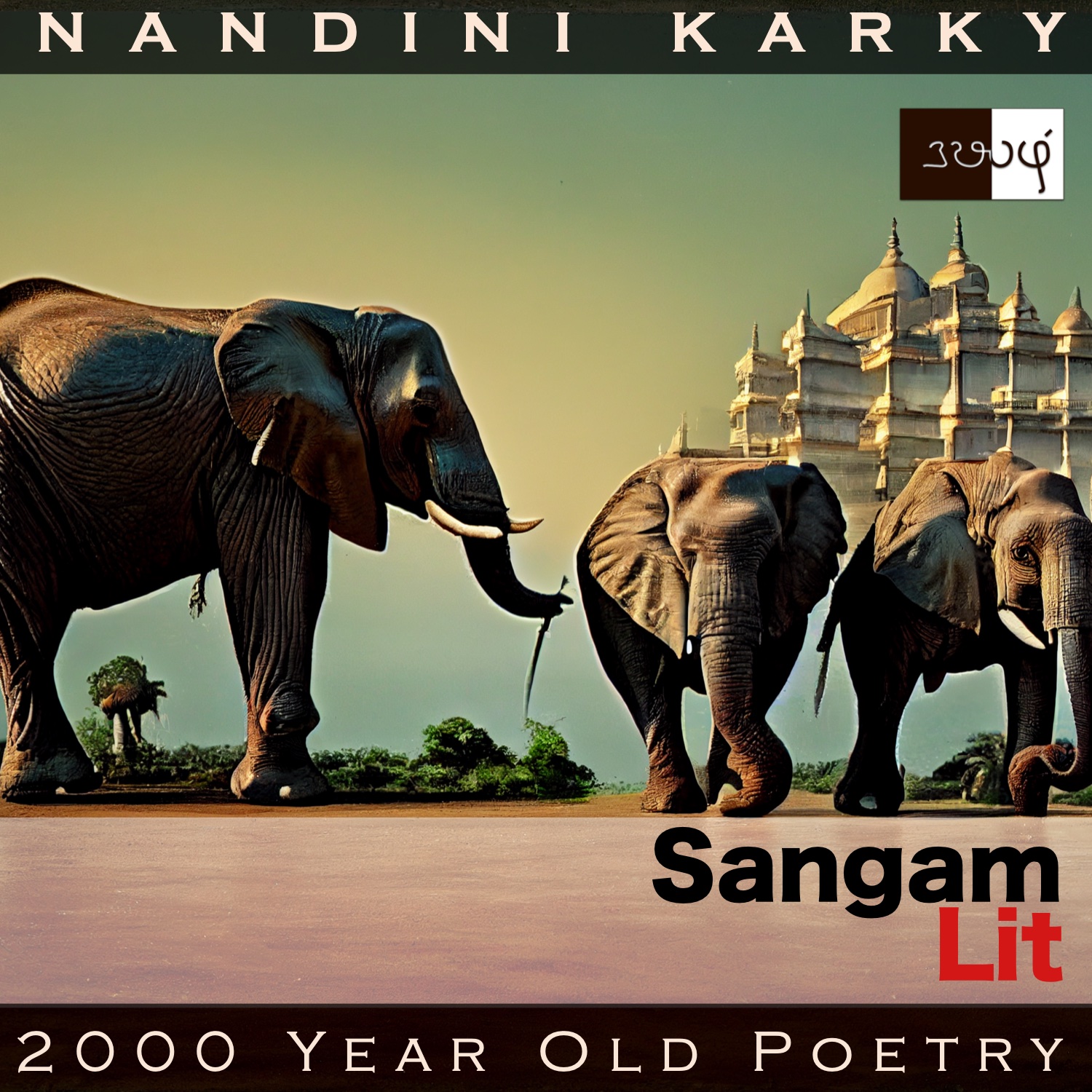Podcast: Play in new window | Download
Subscribe: Apple Podcasts | Spotify | Amazon Music | Android | iHeartRadio | TuneIn | RSS | More
In this episode, we listen to an account of wealth and courage in the king’s country, as depicted in Sangam Literary work, Puranaanooru 68, penned about the Chozha King Nalankilli by the poet Kovoor Kizhaar. The verse is situated in the category of ‘Paadaan Thinai’ or ‘King’s praise’ and directs an impoverished bard to the court of the said king.

உடும்பு உரித்தன்ன என்பு எழு மருங்கின்
கடும்பின் கடும் பசி களையுநர்க் காணாது,
சில் செவித்து ஆகிய கேள்வி நொந்து நொந்து,
ஈங்கு எவன் செய்தியோ? பாண! ‘பூண் சுமந்து,
அம் பகட்டு எழிலிய செம் பொறி ஆகத்து
மென்மையின் மகளிர்க்கு வணங்கி, வன்மையின்
ஆடவர்ப் பிணிக்கும் பீடு கெழு நெடுந் தகை,
புனிறு தீர் குழவிக்கு இலிற்று முலை போலச்
சுரந்த காவிரி மரம் கொல் மலி நீர்
மன்பதை புரக்கும் நல் நாட்டுப் பொருநன்,
‘உட்பகை ஒரு திறம் பட்டென, புட் பகைக்கு
ஏவான் ஆகலின், சாவேம் யாம்’ என,
நீங்கா மறவர் வீங்கு தோள் புடைப்ப,
தணி பறை அறையும் அணி கொள் தேர் வழி,
கடுங் கள் பருகுநர் நடுங்கு கை உகுத்த
நறுஞ் சேறு ஆடிய வறுந் தலை யானை
நெடு நகர் வரைப்பில் படு முழா ஓர்க்கும்
உறந்தையோனே குருசில்;
பிறன் கடை மறப்ப, நல்குவன், செலினே.
A long song talking about the nature of the king and his nation! The poet’s words can be translated as follows:
“With skins stretching over the ribs, looking like skinned monitor lizards, are your relatives. Seeing no one to slay their harsh hunger and only a few, who will heed your troubles, suffering so, what are you doing here, O bard? Bearing ornaments upon their proud and beautiful, red-spotted bosoms are gentle women, to whom he bows, whereas he makes fierce men kneel before him. Such is the great fame of the king, the ruler of the fine country, where akin to a breast that showers milk to a newborn, the river Kaveri flows with copious waters and protects people therein.
‘Thinking about internal strife, if he doesn’t send us to fight enemies outside, we shall die’, shout the soldiers there, with undying courage, with their broad shoulders shaking. To calm them, war drums roar aloud. Hearing that, with shaking hands, those drinking hard toddy spill the same on that beautiful chariot way. Upon that fragrant mud, the dry-haired elephants dance away to the sound of loud drums in the bounds of the tall mansion belonging the ruler of Uranthai. If you go to him, he will render so much that you will forget the gates of others!”
Time to delve into the nuances. The poet first talks about the state of the bard and his relatives, pointing out how thin and starved they look. Then, as if nodding his head in disbelief, the poet wonders why the bard continues to remain in that state. To point out the alternative path, the poet talks about a person, who seems to be gentle and kind with beautiful maiden but fierce and punitive with the men who oppose him. Then, to reveal who this person is, the poet talks about the River Kaveri that flows like milk from a new mother’s breast, protecting the people of that Chozha country and this king turns out to be none other than the ruler of that land.
From the lay of the fertile land, the poet moves to narrate the mood of the soldiers in the capital city. They seem to be shouting out that they would die if the king does not send them to war. This statement is only to say how eager these soldiers are to wage war, and indirectly seems to be making note of their courage. To appease them, war drums resound aloud, and in that sudden sound, those drinking toddy spill the same, and so much precious wine flows in the streets and elephants roll in that fragrant mud, the poet details. He implies that this is the scene epitomising wealth and courage in that Chozha king’s court and concludes by saying, if only the bard were to go thither, this Chozha king would make that bard forget about pleading at the gate of any other king.
The poet’s words is the trusting declaration that the bard has to look nowhere else if only he seeks the favour of this Chozha king Nalankilli. I was amused to read how soldiers clamouring for war seems to be the mark of a great town! Perhaps that is how poets wished to depict the fearlessness of these men and their devotion to their king’s fights. That scene of elephants rolling in toddy-streaked mud reminded me of videos of baby elephants rolling in the mud and having a jolly good time. In essence, the verse talks about the solid mentoring on the part of this poet to another of his kind!




Share your thoughts...